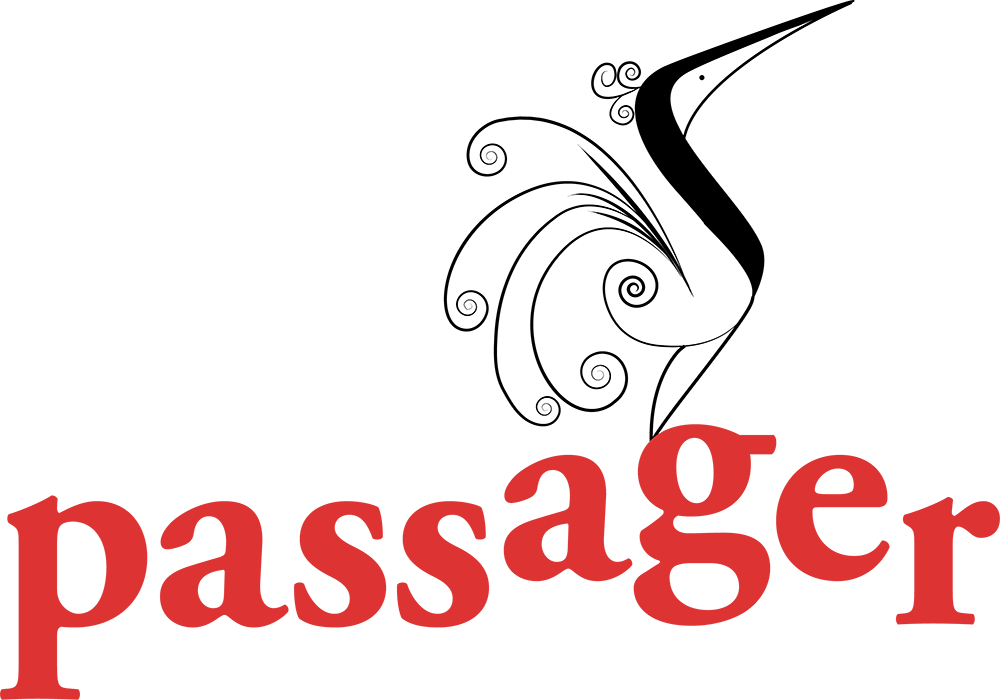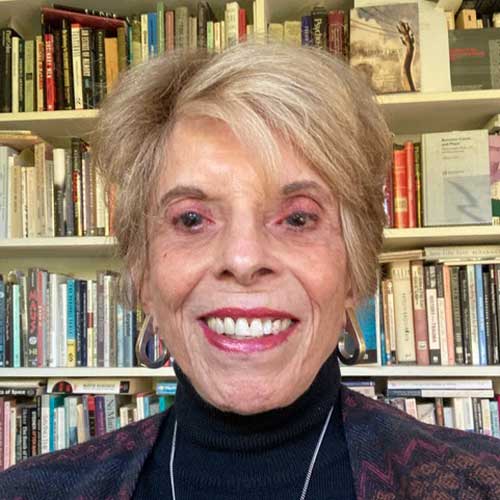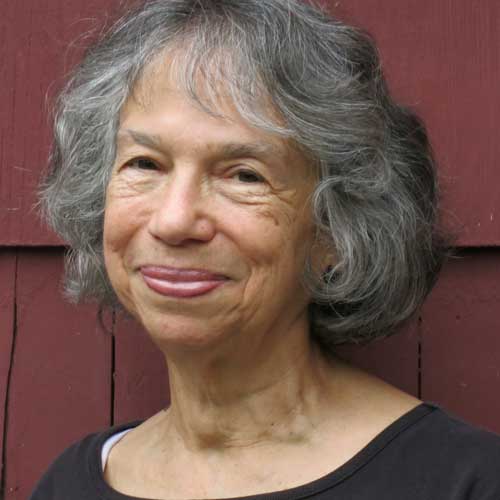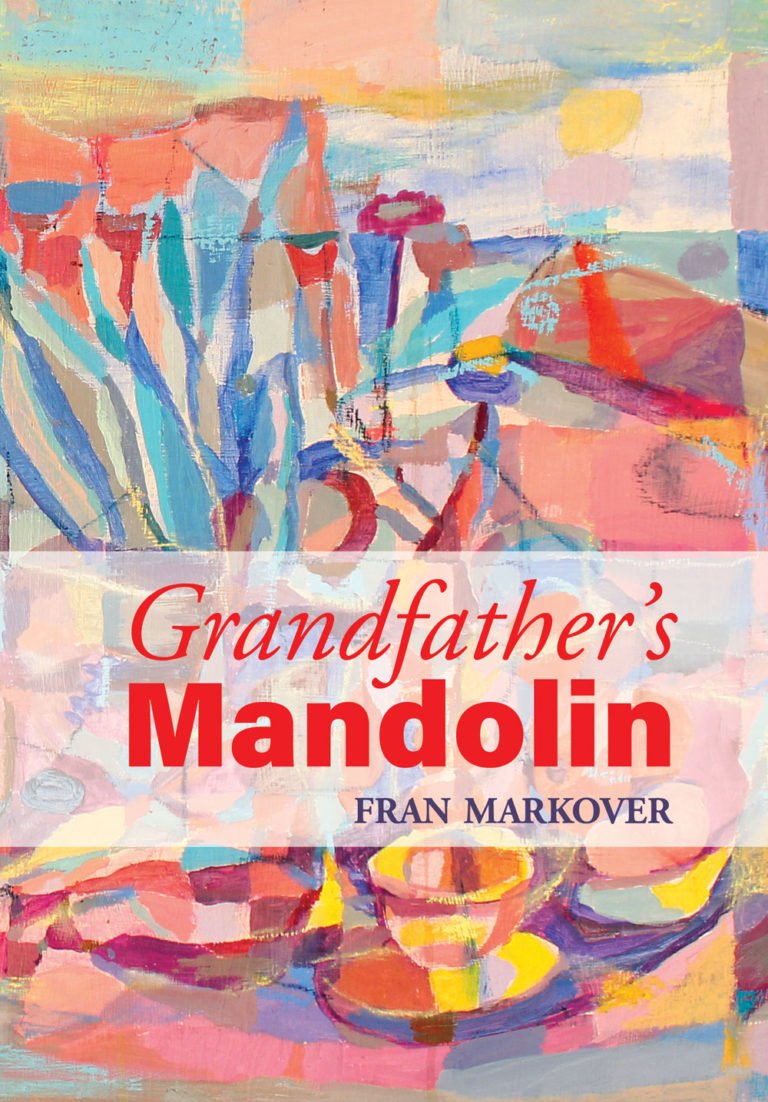An Interview with Fran Markover


A special episode of Burning Bright, featuring an interview with Passager poet Fran Markover, author of Grandfather’s Mandolin.
13 minutes
TRANSCRIPT
RUBY: What kinds of subjects do you like to write about?
FRAN: Memory, loss, honoring, sharing the pieces of the story that I think others can relate to. The joy of connection and reconnection, the mysteries of family.
That was Passager author Fran Markover. Fran wrote the book Grandfather’s Mandolin. She was talking with Passager intern, Middlebury College student Ruby Taylor. On this episode of Burning Bright, excerpts from that interview.
RUBY: You talked about connections and the mysteries of family. And in Grandfather’s Mandolin, you write a lot about your older relatives. Tell us a little about the family you grew up in.
FRAN: I grew up on an old farm, a big old farm, poultry farm, in the Catskill Mountains. And my parents were there, and I lived with my grandmother, my grandfather; my great uncle Julius was living in the attic. We had a lot of relatives coming in, holidays, Jewish and otherwise. And so I think I was held by a lot of little old ladies. Now, of course, I am a little old lady, but at the time I had a lot of nurturance from older people. It was just natural to be interested in the elderly.
My grandparents did not share their stories, but somehow I must have sensed that they had stories to tell because they spoke with accents. My grandmother, Zipporah, and my grandfather, Morris or Moisha. And they would not answer a lot of questions, so when I asked my grandfather about his brothers and sisters, he became very, very quiet. A lot of the family that I have written about stayed in Ukraine and or Poland around Warsaw and were murdered, killed, died around the Holocaust. And I was also told by family, especially my parents, don’t ask your grandparents about their family. Don’t talk to them about their history. So there was a direct message to me, just don’t ask because people won’t tell you or don’t want to tell you their history. And later on in life I started asking my grandmother when she was in her maybe 70s or 80s and my grandmother did share. There was something about Grandma Zipporah that honored connection and a sense of family.
RUBY: I’d love for you to read us a poem from Grandfather’s Mandolin.
FRAN: In my book, there’s a poem called “Collectible.” It’s about my neighbor when we moved off the farm when I was about 9 or 10. My neighbor, Mrs. Silber, and her husband, Herman the Barber, were Holocaust survivors. How did I know that? Because I saw the numbers tattooed on their arms. And I would never dare to talk to them about their experience. And I don’t think they would’ve shared anyway; they were so private. And so I took the idea of numbers and wrote that poem “Collectible” as if they were—and they were numbered people. But that’s really all I knew about the Silbers next door. But I needed to write a poem about them.
Collectible
She reminded me of a porcelain doll.
Her hair was tightened into a ponytail.
She wore long August dresses.
I had never seen anyone with painted crescents
for eyebrows.
She spoke with a German accent we’d imitate
and her house was hospital-scrubbed.
When I asked my mother
what was wrong with the woman who lived next door –
Why is she so pale?
My mother whispered shhh . . .
Once I threw a softball that shattered our neighbor’s glass,
her rosebud smile.
She appeared on our steps, lifted a hand.
I followed the porch light
to authentic skin, her vintage arm, its numbers
in a line tattooed, archived by her keeper.
RUBY: You’ve been talking about the family stories or in some cases absence of stories that made you want to write. Why’d you choose poetry as your genre of choice?
FRAN: My first answer is that it’s quieter and shorter, and that’s how I think. I’m a slow thinker, a deliberate one, and maybe that’s how I see the world—in moments. And poetry captures those moments. I wish I could be a novelist or write a short story or essay, but my words form poems. I’ve had to piece together family history. So I might only have a sentence or two or a paragraph’s worth of Great Uncle Julius or Tanta Ruchel, and that also leads to poems rather than to short stories, I think, or novels.
RUBY: So you decided poetry was the best genre for you. Did you get an MFA? Did you just start writing poems? How’d you get from there to here?
FRAN: When I was 40 I made a decision to stop working full time and work three-quarter time at my day job which was as a family therapist and addictions counselor. And that quarter chunk of time gave me more time to start working as a poet, writing as a poet. And then I just started writing poems very quietly at night, in my free time, whenever I could.
And one thing led to another. And I met a friend in the supermarket, and she said, “Why don’t you join my poetry group.” So I joined a poetry group that’s lasted about 30 years. And they encouraged me to send my work out, and I sent it to different journals. And that’s how I became a poet. I took classes, studied a little bit with Sharon Olds and Galway Kinnell. I took a feminist women’s writing workshop and met Lucille Clifton. It was something organic that just happened poem by poem, friend by friend.
RUBY: You alluded to hearing a lot of Yiddish when you were a child. Did being around another language affect your own sense of language?
FRAN: The language of my family was very colorful, especially the elder people who would come long ago for Passover and make jokes or say things like, “May he live to be 100 years old but let all his teeth fall out . . .” They would say all these Yiddish expressions that to me are funny and real and different . . . and poetical.
RUBY: Your book, as well as what you’ve talked about in this interview, emphasizes your Jewish roots. Just out of curiosity, do you speak and read Hebrew?
FRAN: I did, at age 67 or so, start to learn Hebrew with a group of women who were also learning to speak Hebrew (I think I was the eldest of the group). And letter by sound, I learned the Hebrew alphabet and Hebrew words. It’s not always easy to learn a different language when you’re older—or at any age, perhaps. But I was just pleased that I could take lessons and make mistakes with language and do better the next day with my Hebrew letters and sounds. And naturally, I think a poem just came from those lessons. So it felt like a good opening for the book, somehow, because it was a beginning for me.
Learning Hebrew at Age 67
There’s something reverential about the block forms like
kneeling at a stone wall. Sometimes the choking sounds
are sobs for stories of my heritage. Some tones are music,
slow me down with murmurings. Mostly, I’m five again
pointing out letters – bet בּ solid as a foundation for home
or aleph א strong, silent until it shouts with ahs and oohs
for the awe of another day. A few letters rest against each
other, remind me to pause, honor those who’ve passed –
family with singsong voices I’ve broken bread with. They’d
be stunned to hear their relative, who once rejected every-
thing Jewish, struggling with Hebrew consonants and vowels.
How I trace shapes with my fingers as if I’m reading lifelines.
It’s amazing the way these letters have traveled far through
the years like gimmel ג sturdy, proud, booted, looking like
a man who’s journeyed from Ukraine’s bread-basket to sun-
flowered fields of upstate New York. Letters holding hands
with each other – syllables so powerful Grandfather rocked
back and forth whispering them, wrapping his tallith across
his shoulders. He’d be pleased I practice, finesse letters side
by side to make a word or two like my first one – Baruch –
blessed – good place to begin, an offering for everyone I love
or an ending – Baruch – when the moon writes its nightly
scripts, divine sparks scribbled as with a child’s unsure hand.
RUBY: I’ve really enjoyed talking with you, Fran, and coming to better understand the way your poetry grows out of your life and your memories. Any last thoughts?
FRAN: I’m just thinking that this is the first interview that I’ve ever had, so thank you for asking me, Ruby. To me, for me, poetry is transcendent. It’s maybe what I didn’t hear that helped me become a poet, so that I wanted to fill in the emptiness, the spaces.
Fran Markover speaking with Ruby Taylor.
To buy Fran’s book Grandfather’s Mandolin, subscribe to or learn more about Passager and its commitment to writers over 50, go to passagerbooks.com.
Passager’s offering a five-session poetry writing workshop beginning March 23 for writers in the Baltimore area. If you’d like more information, go to the Events page on our website, passagerbooks.com. We hope that in the not-too-distant future, we’ll be offering online workshops, as well. We’ll let you know as those develop.
You can download Burning Bright from Spotify, Apple and Google Podcasts, and various other podcast apps. Passager offers a 25% discount on the books and journal issues featured here on Burning Bright. Visit our website to see what’s on sale this week.
Again, thanks to Middlebury College intern Ruby Taylor for her help with this podcast.
For Kendra, Mary, Christine, Rosanne, and the rest of the Passager staff, I’m Jon Shorr.



